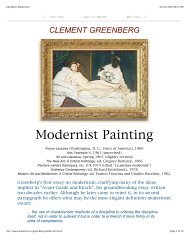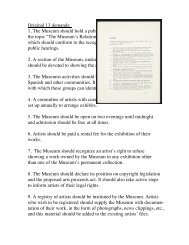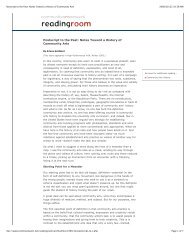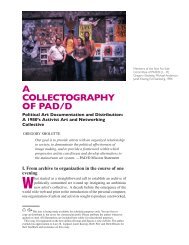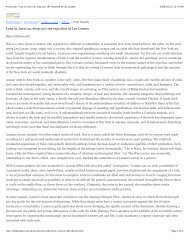The New Spirit of Capitalism - Dark Matter Archives
The New Spirit of Capitalism - Dark Matter Archives
The New Spirit of Capitalism - Dark Matter Archives
You also want an ePaper? Increase the reach of your titles
YUMPU automatically turns print PDFs into web optimized ePapers that Google loves.
25bureaucracy. This was very different from that which had been observed during the precedingera.<strong>The</strong> most pugnacious author on this topic has turned out to be Bob Aubrey, who likesto remind his readers that Maslow’s pyramid is a false scientific law (11). Notwithstandingthis allegation, management authors also know that few people will feel attracted by theirproposals if they don’t <strong>of</strong>fer any new forms <strong>of</strong> security. <strong>The</strong>y are aware <strong>of</strong> the need to proposesomething that can replace the hierarchical careers that had been such an integral part <strong>of</strong> thesecond spirit <strong>of</strong> capitalism. One suggestion has been that this format should be replaced by theidea <strong>of</strong> a succession <strong>of</strong> projects. In this conception, people no longer develop careers, ratherthey move from one project to another, with their success on a given project being that whichenables them to accede to another, more interesting one. Each project is an opportunity tomake many new acquaintances, and it therefore <strong>of</strong>fers people the chance to earn a solidreputation and to be co-opted into a new activity. Moreover, given that each project, bydefinition, is different, new and innovative in nature, it can be presented as an opportunity forlearning and for adding to one’s own competencies – this being an advantage in finding otherengagements (12) (13).<strong>The</strong> key concept in this view <strong>of</strong> working life is employability. This notion is supposedto describe the ability that people must possess if they want to be asked to participate in agiven project. <strong>The</strong> transition from one project to another is an opportunity to enhance one’semployability. This is a personal capital that each individual has to manage in his/her ownway. It is the sum total <strong>of</strong> a person’s usable competencies. A firm will be seen as <strong>of</strong>fering acertain form <strong>of</strong> security when it develops rather than destroys its employees’ employability atthose times that it is unable to avoid either dismissing people or else when it cannot <strong>of</strong>ferthem a promotion (14). As such, the 1990s authors do <strong>of</strong>fer several solutions for job securityrelatedproblems, even though their proposals lack an instrumentation that is comparable tothat which had been on <strong>of</strong>fer in 1960s writings on managing executive workforces - literaturethat had provided many details on the best ways to recruit and evaluate people, or on how tohelp them to develop. In the texts we read, there were hardly any systems for assessingemployability, for verifying whether it is on the rise or else deteriorating, etc. One optimisticexplanation for this would be that the texts from the 1960s involve a relatively lateformulation <strong>of</strong> the second spirit <strong>of</strong> capitalism. This was an era during which the then currentspirit had already been in place for quite some time. <strong>The</strong> 1990s texts on the other hand areassociated with a brand new spirit <strong>of</strong> capitalism, one that is just emerging, and which has notyet reached the height <strong>of</strong> its motivational powers.Extracts:11. Organisations nowadays have to assimilate a new reality, and treat each employee as if s/he were a firm.This change means that some <strong>of</strong> the suppositions that had dominated industrial society have to beabandoned, first and foremost the idea that people are looking for job security. This is a 1950s concept bornout <strong>of</strong> Abraham Maslow’s famous “pyramid <strong>of</strong> needs”, with its postulate that fundamental needs must besatisfied before we can even begin to consider other types <strong>of</strong> fulfilment. Now, not only is this thesisproblematic from a theoretical perspective (how does it explain the fact that some people risk their[material] security to become artists or to start a new career?), but there is little justification for the way inwhich it has been interpreted in management circles (i.e., the firm’s first responsibility is to create a secureenvironment, with fulfilment only coming at a later stage). (Aubrey, 1994).12. <strong>The</strong> post-industrial career is an unending sprint from one project to the next. <strong>The</strong> measure <strong>of</strong> success <strong>of</strong> agiven project is the value that it adds (...) Each person depends much more on his/her own resources ratherthat on the destiny <strong>of</strong> whatever company happens to be the titular employer at the time. Those who are notconversant in the art <strong>of</strong> climbing the hierarchical ladder tend to fall by the wayside (...) Everyone has to



